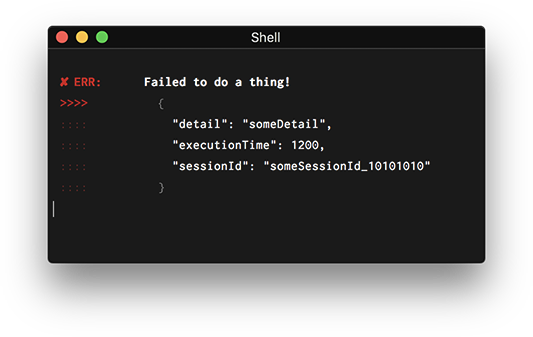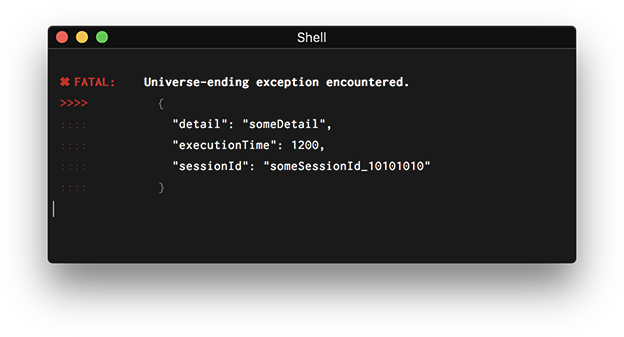zaq
Did we need another NodeJS logging utility? I dunno. Did we get one? Yeah.
Have you met zaq? He's all about practicality and style. What are you doing? Shake his hand!
Author: Austin Billings License: MIT
Contents
Intro
Installation
You know the drill. Install via NPM:
npm install zaq
(or Yarn, if you, too, are a hipster):
yarn add zaq
Then just require in your Node based project:
const zaq = require('zaq');Basic Usage
- Namespaced logging is easy, using
zaq.as('MyNamespace'). Seezaq.as()details below. -
zaqlogging functions are chainable, since each logging function returns its parentzaqinstance. -
Loggable objects passed after the message are rendered in "pretty print" so you can easily visually grep for meaningful bits. Pass as many objects as you want as additional arguments to any
zaqlogging function.
Log Levels
In basic usage (i.e. purely logging to the transient console), logging level does not have any impact, but when you leverage zaq.use, you can divert messages of specific levels to different recipients (resembling a simple message bus platform). More info on zaq.use can be found below.
| Level | Level Name | Methods At This Level |
|---|---|---|
| 0 | debug |
zaq.debug |
| 1 | info |
zaq.info, zaq.ok, zaq.flag, zaq.time, zaq.divider
|
| 2 | warn |
zaq.warn |
| 3 | error |
zaq.err |
| 4 | fatal |
zaq.fatal |
Logging Styles
Use the following zaq methods to log info from your app in more meaningful ways. Each logging "style" has an associated prefix, color, and logging level.
The styles described below are built-in to zaq, but you can easily create your own logging types at a per-instance level using zaq.createLogStyle;
zaq.ok(message[, ...loggables])
Color: green | Level: 1 – info
Prints a message and any additional "loggable" values in the "OK" style, indicating successful operations.
Example:
const zaq = require('zaq');
zaq.ok('Successfully completed task.', {
detail: 'someDetail',
executionTime: 1200,
sessionId: 'someSessionId_10101010'
});zaq.err(message[, ...loggables])
Color: red | Level: 3 – error
Prints a message and any additional "loggable" values in the "ERR" style, indicating an error encountered.
Example:
const zaq = require('zaq');
zaq.err('Failed to do a thing!', {
detail: 'someDetail',
executionTime: 1200,
sessionId: 'someSessionId_10101010'
});zaq.fatal(message[, ...loggables])
Color: red | Level: 4 – fatal
Prints a message and any additional "loggable" values in the "FATAL" style, indicating a fatal exception. Similar to the err level, but with a higher log level severity (for potentially diverting messages to a developer's inbox, etc.).
Example:
const zaq = require('zaq');
zaq.fatal('Universe-ending exception encountered.', {
detail: 'someDetail',
executionTime: 1200,
sessionId: 'someSessionId_10101010'
});zaq.info(message[, ...loggables])
Color: blue | Level: 1 – info
Prints a message and any additional "loggable" values in the "INFO" style, indicating situation-neutral general information.
Example:
const zaq = require('zaq');
zaq.info('Neutral information, always nice:', {
detail: 'someDetail',
executionTime: 1200,
sessionId: 'someSessionId_10101010'
});zaq.warn(message[, ...loggables])
Color: yellow | Level: 2 – warn
Prints a message and any additional "loggable" values in the "WARN" style, indicating warnings and similarly attention-worthy messages.
Example:
const zaq = require('zaq');
zaq.warn('Attempted to do bad thing...:', {
detail: 'someDetail',
executionTime: 1200,
sessionId: 'someSessionId_10101010'
});zaq.flag(message[, ...loggables])
Color: magenta | Level: 1 – info
Prints a message and any additional "loggable" values in the "FLAG" style, indicating neutral yet high-profile information.
Example:
const zaq = require('zaq');
zaq.flag('Something you should know.', {
detail: 'someDetail',
executionTime: 1200,
sessionId: 'someSessionId_10101010'
});
zaq.debug(message[, ...loggables])
Color: cyan | Level: 0 – debug
Prints a message and any additional "loggable" values in the "DEBUG" style, indicating potentially low-level developer-to-developer information for debugging purposes.
Example:
const zaq = require('zaq');
zaq.debug('Some debugging info...', {
detail: 'someDetail',
executionTime: 1200,
sessionId: 'someSessionId_10101010'
});
zaq.time(message[, ...loggables])
Color: grey | Level: 1 – info
Prints a message and any additional "loggable" values in the "TIME" style, indicating temporally-related information.
Color: grey
Log Level: 1: info
Example:
const zaq = require('zaq');
zaq.time('MyProcess consumed ' + some_duration + 'ms compute time', {
start: some_start_time,
end: some_end_time
});Other Utilities
zaq.divider(dividerText[, options])
Prints a "divider"-style line for better visual separation in your logs. Automatically fills the width of the present console process. Accepts several options:
| Option Key | Accepted Values | Default Value | Info |
|---|---|---|---|
centered |
true or false
|
false |
"Centers" the divider text when true
|
space |
Integers | 0 | Number of empty line-breaks to pad before and after the divider |
lineSymbol |
A String | '-' |
Character to repeat to render the divider "line". Can be multiple characters or an empty space. |
lineColor |
A valid chalk color string. |
Uses chalk to render the divider "line" in a given color. |
Log Level: 1: info
Example:
const zaq = require('zaq');
zaq
.flag('Pre-divider text')
.divider('Cool Divider Text', { lineColor: 'magenta', space: 1, centered: true })
.flag('Post-divider text');
zaq.weight(filepath)
Gets the 'weight' (size in KB) of the file at a given path. Logs the filesize using zaq.info.
Example:
const zaq = require('zaq');
zaq.weight('./weight.js');Advanced
zaq.as(namespace)
Returns a new instance of zaq wherein all log messages will be prefixed with the given namespace name. namespace can take the form of a string, number, or object (on which toString will be called for serialized identification, so be careful!).
zaq instances are managed globally. This means that you can say const zaq = require('zaq').as('MyModule') in two different files, but both zaq references will actually refer to the same instance.
Example:
const fooZaq = require('zaq').as('Foo');
const barZaq = require('zaq').as('Bar_Module');
fooZaq.info('Some Information from Clone A.');
barZaq.info('Some Differing Information from Clone B.');
zaq.use(handlerConfig)
Registers a message/log handler with zaq.
Returns a numerical index which can be passed to zaq.dispose() afterward to remove/disable the handler.
A handlerConfig looks like this:
{
handler: function someHandlerFunction (logMessage) {
// logMessage is the complete "message" string, including
// prefixes, namespaces, whitespace, and ASCII color
// codes (unless { stripColors: true } is given)
// e.g.,
// "[Foo] → INFO: Some Information from Clone A."
doSomethingWith(logMessage);
},
options: {
logLevel: 1,
stripColors: true
}
}The following options are accepted. All options are optional.
| Option Key | Accepted Values | Default Value | Info |
|---|---|---|---|
logLevel |
Integers 0-4 | 0 | Only log messages of the given level or higher are passed to the handler. For instance, a value of 1 will prevent the handler from ever receiving debug-level messages. See the table above for more information about log levels. |
acceptLevels |
A single level string of an array of log level names. | When given, only messages with a log level contained in this array are passed to the handler. For example, { acceptLevels: 'debug' } would allow the handler function to only receive debug-level messages. Note: log messages must meet the criteria of both acceptLevels AND logLevel if both are provided. (E.g., { logLevel: 3, acceptLevels: ['debug']} will never handle any messages.) |
|
stripColors |
true or false
|
false |
When true, all ASCII-based color codes are stripped from the output. Useful when writing log messages somewhere other than a standard terminal (like a plaintext file, for instance). |
timestamps |
true or false
|
false |
When true, simple timestamps are prepended to logging messages. Especially useful when persisting logs to any sort of storage. |
Example:
const zaq = require('zaq').as('MyService');
// ( ... )
function persistentLoggerFn (logMessage) {
addMessageToWriteBuffer(logMessage);
}
function fatalErrorHandler (fatalMessage) {
dispatchMidnightEmail({
to: 'sleepingDev@website.com',
message: fatalMessage
});
}
const persistentHandler = zaq.use(persistentLoggerFn, {
timestamps: true,
stripColors: true,
logLevel: 1
});
const fatalHandler = zaq.use(fatalErrorHandler, {
timestamps: true,
stripColors: true,
logLevel: 4
});
// ( ... )
zaq.warn('User email duplicate detected.', { user });
// ^ This message is a warning (level 2), so it will hit "persistentLoggerFn",
// which passes on the message to some disk write operation.
zaq.fatal('Failed to reconnect to DB Interface.', { dbResponse });
// ^ This message is a fatal error (level 4), so it will hit both "persistentLoggerFn"
// AND "fatalErrorHandler", which will send an email to our poor sleeping dev
// with the message content like this (truncated):
//
// 3/16/2018 11:52:14 PM [MyService] ✖ FATAL: Failed to reconnect to DB Interface.
// 3/16/2018 11:52:14 PM [MyService] >>>> {
// 3/16/2018 11:52:14 PM [MyService] :::: "dbResponse": [...]
// ...
zaq.dispose(handlerIndex)
Deletes the handler & options associated with the given handlerIndex, which is originally given as the return value of zaq.use.
Example:
// --> continued from previous example
// ( ... )
if (siteIsNoLongerLive()) {
zaq.dispose(fatalHandler);
}
// ( ... )
zaq.fatal('Oh no, the servers are on fire again.', request, { serverFireStats });
// ^ Since we disposed of the "fatalHandler" due to some site going offline,
// this fatal error will be logged using "persistentLoggerFn", but will NOT
// trigger a 3 AM email to our sleeping dev. Rejoice!
zaq.createLogStyle({ style, prefix, level })
Returns a ready-to-use logger function with the specified "style" (a valid chalk color), prefix text, and level name. Useful for creating your own custom log types.











